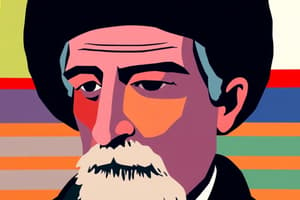Podcast
Questions and Answers
What are the three types of equality discussed in political theory?
What are the three types of equality discussed in political theory?
Formal equality, material equality, and procedural equality.
How is sovereignty defined in political theory?
How is sovereignty defined in political theory?
Sovereignty is the supreme power or authority of a state to govern within its borders.
What does legitimacy refer to in a political context?
What does legitimacy refer to in a political context?
Legitimacy refers to the acceptance and justification of a political system's rules and institutions by those it governs.
What are the primary branches of political theory mentioned?
What are the primary branches of political theory mentioned?
What contemporary issue involves the balance between individual rights and collective needs?
What contemporary issue involves the balance between individual rights and collective needs?
What is the primary focus of political theory?
What is the primary focus of political theory?
How did Hobbes view the role of government in relation to individual rights?
How did Hobbes view the role of government in relation to individual rights?
What concept did Rousseau introduce regarding civic participation?
What concept did Rousseau introduce regarding civic participation?
What did John Locke advocate for in terms of government structure?
What did John Locke advocate for in terms of government structure?
What is meant by the concept of justice in political theory?
What is meant by the concept of justice in political theory?
Flashcards
Political Power
Political Power
The ability to influence or control others, especially in a political context.
Sovereignty
Sovereignty
The supreme power and authority of a state within its borders.
Legitimacy (Political)
Legitimacy (Political)
The acceptance of a political system's rules and institutions by its people.
Normative Theory (Politics)
Normative Theory (Politics)
Signup and view all the flashcards
Globalization
Globalization
Signup and view all the flashcards
Political Theory
Political Theory
Signup and view all the flashcards
Justice
Justice
Signup and view all the flashcards
Freedom
Freedom
Signup and view all the flashcards
Plato
Plato
Signup and view all the flashcards
Machiavelli
Machiavelli
Signup and view all the flashcards
Study Notes
Defining Political Theory
- Political theory is the study of fundamental questions about government, politics, and the relationship between individuals and society.
- It explores concepts like justice, freedom, equality, and power.
- It analyzes different forms of governance and political ideologies.
- It critically examines existing political systems and proposes alternatives.
- It draws on various disciplines like philosophy, history, sociology, and economics.
Key Historical Thinkers
- Plato: Focused on ideal forms of government, including the philosopher-king. His work The Republic explored justice and the role of the state.
- Aristotle: Examined different types of constitutions and emphasized the importance of balance of power. Politics is his key work on political systems.
- Machiavelli: Offered a pragmatic and realistic view of power politics, emphasizing the need for rulers to maintain order and stability. The Prince examines how political leaders should attain and maintain power.
- Hobbes: Argued for a strong, centralized government as essential for the protection of individual rights. Leviathan explores human nature and the necessity of social contract.
- Locke: Advocated for limited government and natural rights, emphasizing individual liberty and property. Two Treatises of Government explores the idea of limited government and individual rights.
- Rousseau: Focused on the social contract and the general will, arguing that true liberty comes from participating in governance. The Social Contract and Discourse on Inequality are influential texts.
- Marx: Developed critiques of capitalism and its inherent inequalities, arguing for a classless society. Das Kapital analyzes economic and social systems and is a foundational text of socialist thought.
- Mill: Emphasized individual liberty and the importance of minority rights. On Liberty a key work on individual rights and freedom.
Core Concepts
- Justice: The concept of fairness and righteousness in social and political relations. Various theories of justice exist including distributive, corrective, and procedural.
- Freedom: The capacity to act autonomously. Different forms of freedom exist: political, economic, and social.
- Equality: The concept of equal treatment and opportunity. Different forms of equality exist including formal equality, material equality, and procedural equality
- Power: The ability to influence or control others. Political power is a key aspect of political systems.
- Sovereignty: The supreme power or authority of a state, typically relating to its ability to govern within its borders.
- Legitimacy: The acceptance and justification of a political system's rules and institutions by those subject to them.
Branches of Political Theory
- Normative Theory: Addresses questions of value and ethical judgments.
- Analytical Theory: Uses rigorous philosophical methods to analyze fundamental concepts.
- Empirical Theory: Examines political phenomena using evidence-based methods.
- Ideology: Systems of ideas and beliefs about how societies and governments should be organized. Examines ideologies like liberalism, conservativism, socialism, feminism, and environmentalism.
Contemporary Issues
- Globalization: The increasing interconnectedness of the world.
- Democracy: Modern forms and challenges, including the balance between individual rights and collective needs.
- Inequality: The various forms and their implications for social and political structures.
- Security: Issues related to terrorism, war, and international conflicts.
- Identity: The social and political role of national and racial identities.
Studying That Suits You
Use AI to generate personalized quizzes and flashcards to suit your learning preferences.
Description
Explore the fundamental questions of political theory, including concepts like justice, freedom, and power. Delve into the ideas of key historical thinkers such as Plato, Aristotle, and Machiavelli as they examine governance and political systems. Understand how these theories apply to contemporary politics and governance models.




